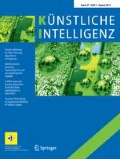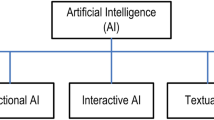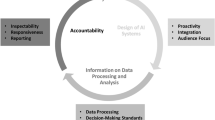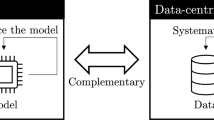Abstract
The field of artificial intelligence, especially research on knowledge representation and reasoning, has originated a large variety of formats, languages, and formalisms. Over the decades many different tools emerged to use these underlying concepts. Each one has been designed with some specific application in mind. In the century of Industry 4.0 and the Internet of Things, a formal way to uniformly exchange information, such as knowledge and belief, is imperative. That alone is not enough, because even more systems get integrated into this online setting and nowadays we are confronted with a huge amount of continuously flowing data. Therefore a solution is needed to both, allowing the integration of information and dynamic reaction to the data. My thesis aims to present a unique and novel pair of formalisms to tackle these two important needs by proposing an abstract and general solution.

Similar content being viewed by others
Notes
Note that it is not intended to replace a medical doctor or care staff, it is intended to filter non-harmful situations from harmful ones to support the care worker.
If the hardest context is in the polynomial hierarchy the overall complexity rises by one level on the hierarchy.
That language is a set of abstract information and its content is limited by context formalisms and evaluation methods.
References
Alferes JJ, Brogi A, Leite JA, Pereira LM (2002) Evolving logic programs. In: Flesca S, Greco S, Leone N, Ianni G (eds) JELIA 2002, LNCS, vol 2424. Springer, New York, pp 50–61. https://doi.org/10.1007/3-540-45757-7_5
Beck H, Dao-Tran M, Eiter T, Fink M (2015) LARS: a logic-based framework for analyzing reasoning over streams. In: Bonet B, Koenig S (eds) AAAI Conf. on AI, 2015. AAAI Press, Cambridge, pp 1431–1438
Brewka G, Eiter T (2007) Equilibria in heterogeneous nonmonotonic multi-context systems. In: AAAI Conf. on AI, 2007, AAAI Press, Cambridge, pp 385–390
Brewka G, Ellmauthaler S, Gonçalves R, Knorr M, Leite J, Pührer J (2016) Inconsistency management in reactive multi-context systems. In: Michael L, Kakas AC (eds) Logics in artificial intelligence. JELIA 2016, LNCS, vol 10021. Springer, Cham, pp 529–535. https://doi.org/10.1007/978-3-319-48758-8_35
Brewka G, Ellmauthaler S, Gonçalves R, Knorr M, Leite J, Pührer J (2016) Towards inconsistency management in reactive multi-context systems. In: Booth R, Casini G, Klarman S, Richard G, Varzincza IJ (eds) DARe-16, CEUR Workshop Proceedings. CEUR-WS.org. http://ceur-ws.org/Vol-1626/DARe-16_5.pdf
Brewka G, Ellmauthaler S, Gonçalves R, Knorr M, Leite J, Pührer J (2018) Reactive multi-context systems: Heterogeneous reasoning in dynamic environments. Artif Intell 256:68–104. https://doi.org/10.1016/j.artint.2017.11.007
Brewka G, Ellmauthaler S, Pührer J (2014) Mulit-context systems for reactive reasoning in dynamic environments. In: Ellmauthaler S, Pührer J (eds.) ReactKnow 2014, pp 23–30. arXiv:1505.05366
Brewka G, Ellmauthaler S, Pührer J (2014) Multi-context systems for reactive reasoning in dynamic environments. In: Schaub T, Friedrich G, O’Sullivan B (eds) ECAI 2014, FAIA, vol 263. IOS Press, Amsterdam, pp 159–164. https://doi.org/10.3233/978-1-61499-419-0-159
Cabalar P, Costantini S, Formisano A (2017) Multi-context systems: dynamics and evolution. In: Bogaerts B, Harrison A (eds) ASPOCP@LPNMR 2017, CEUR workshop proceedings, vol 1868. CEURWS.org. http://ceur-ws.org/Vol-1868/p1.pdf
Dao-Tran M, Eiter T (2017) Streaming multi-context systems. In: Sierra C (ed.) IJCAI 2017, pp 1000–1007. ijcai. org. https://doi.org/10.24963/ijcai.2017/139
Ellmauthaler S (2013) Generalizing multi-context systems for reactive stream reasoning applications. In: Jones AV, Ng N (eds) ICCSW 2013, OpenAccess Series in Informatics (OASIcs), pp 17–24. Schloss Dagstuhl–Leibniz-Zentrum fuer Informatik. https://doi.org/10.4230/OASIcs.ICCSW.2013.19
Ellmauthaler S (2018) Multi-Context Reasoning in Continuous Data-Flow Environments. Ph.D. thesis, Leipzig University. http://nbn-resolving.de/urn:nbn:de:bsz:15-qucosa2-214577
Ellmauthaler S, Pührer J (2014) Asynchronous multi-context systems. In: Ellmauthaler S, Pührer J (eds) ReactKnow 2014, pp 31–38. arXiv:1505.05367
Ellmauthaler S, Pührer J (2016) Stream packing for asynchronous multi-context systems using ASP. In: Eiter T, Faber W, Woltran S (eds) TAASP 2016. arXiv:1611.05640
Gonçalves R, Knorr M, Leite J (2014) Evolving multi-context systems. In: Schaub T, Friedrich G, O’Sullivan B, (eds.) ECAI 2014, FAIA, vol 263, pp 375–380. https://doi.org/10.3233/978-1-61499-419-0-375
Özçep, Özgür.L, Möller R, Neuenstadt C, Zheleznayakow D, Kharlamov E, Horrocks I, Hubauer T, Roshchin M (2013) D5.1 Exec. Summary: a semantics for temporal and stream-based query answering in an OBDA context. Tech. rep., Optique FP7-ICT-2011-8-318338 Project
Author information
Authors and Affiliations
Corresponding author
Additional information
Parts of this work have been funded by DFG Project BR-1817/7-2 and the DFG Research Unit FOR 1513.
Rights and permissions
About this article
Cite this article
Ellmauthaler, S. Multi-Context Reasoning in Continuous Data-Flow Environments. Künstl Intell 33, 101–104 (2019). https://doi.org/10.1007/s13218-018-00570-1
Published:
Issue Date:
DOI: https://doi.org/10.1007/s13218-018-00570-1




